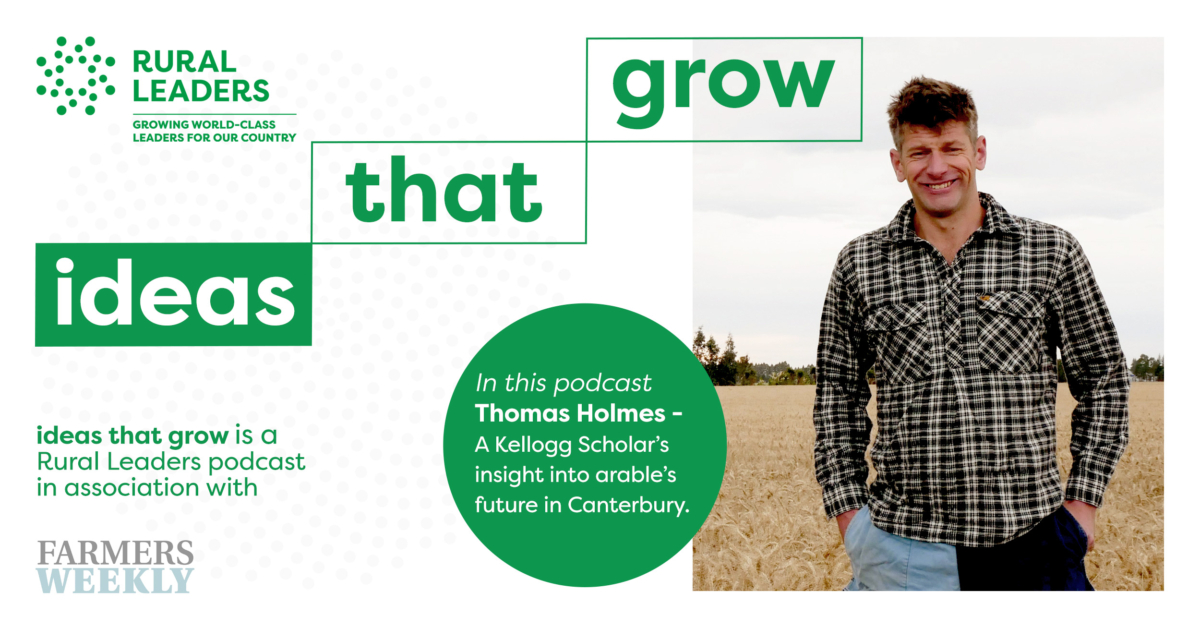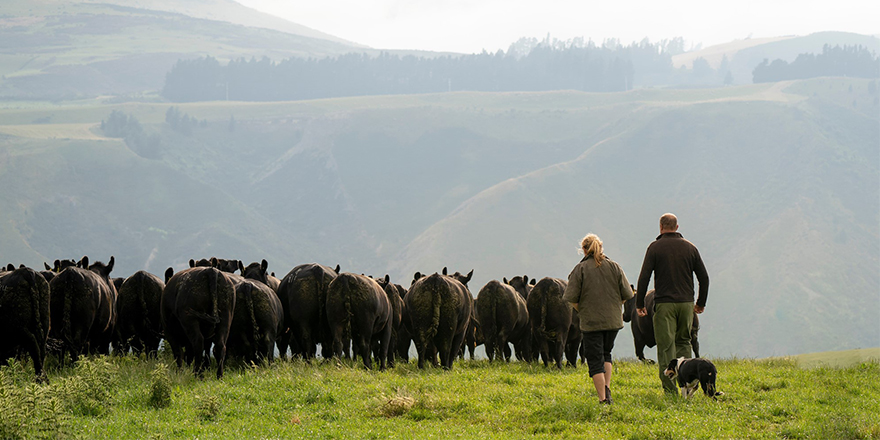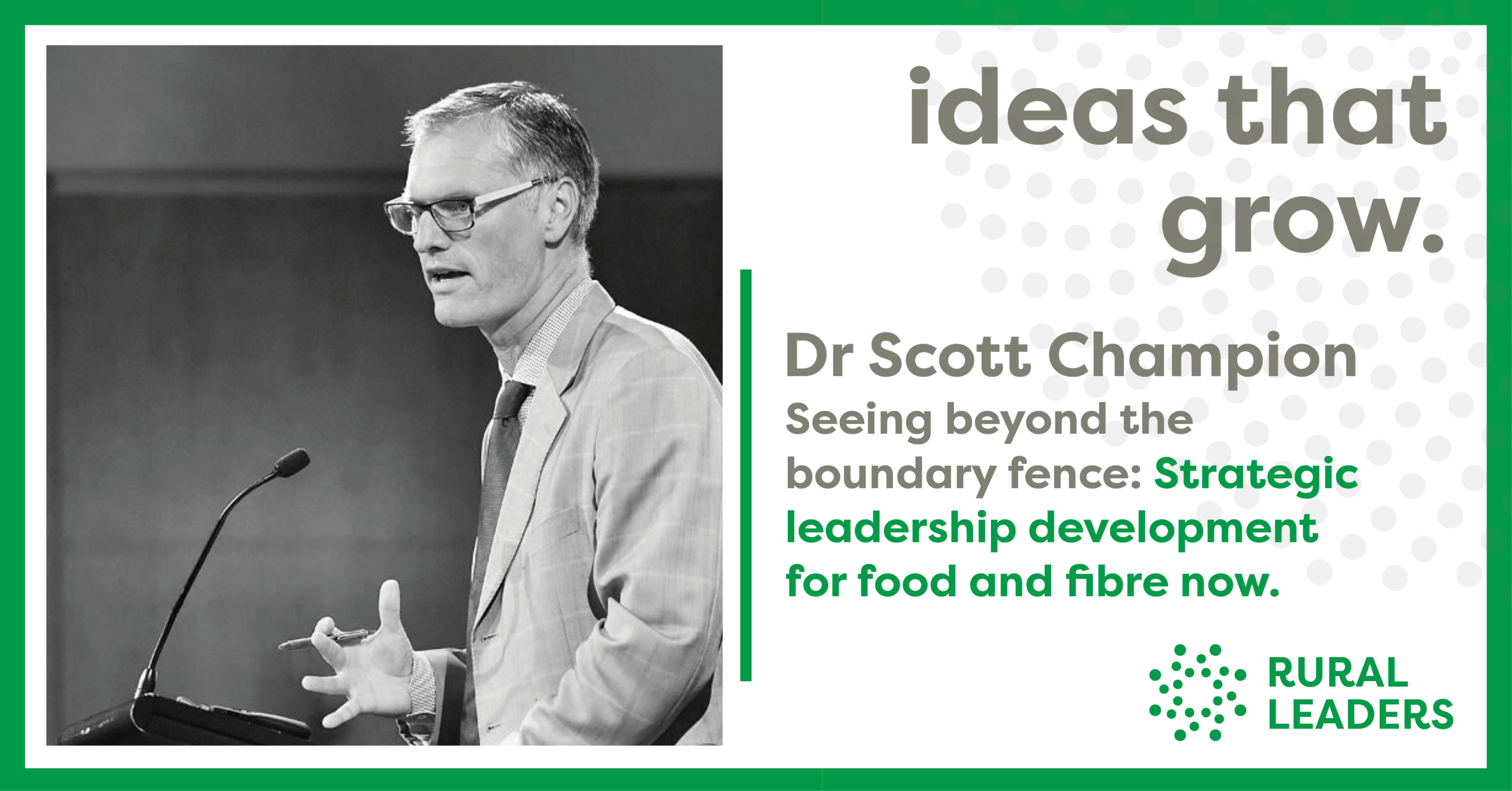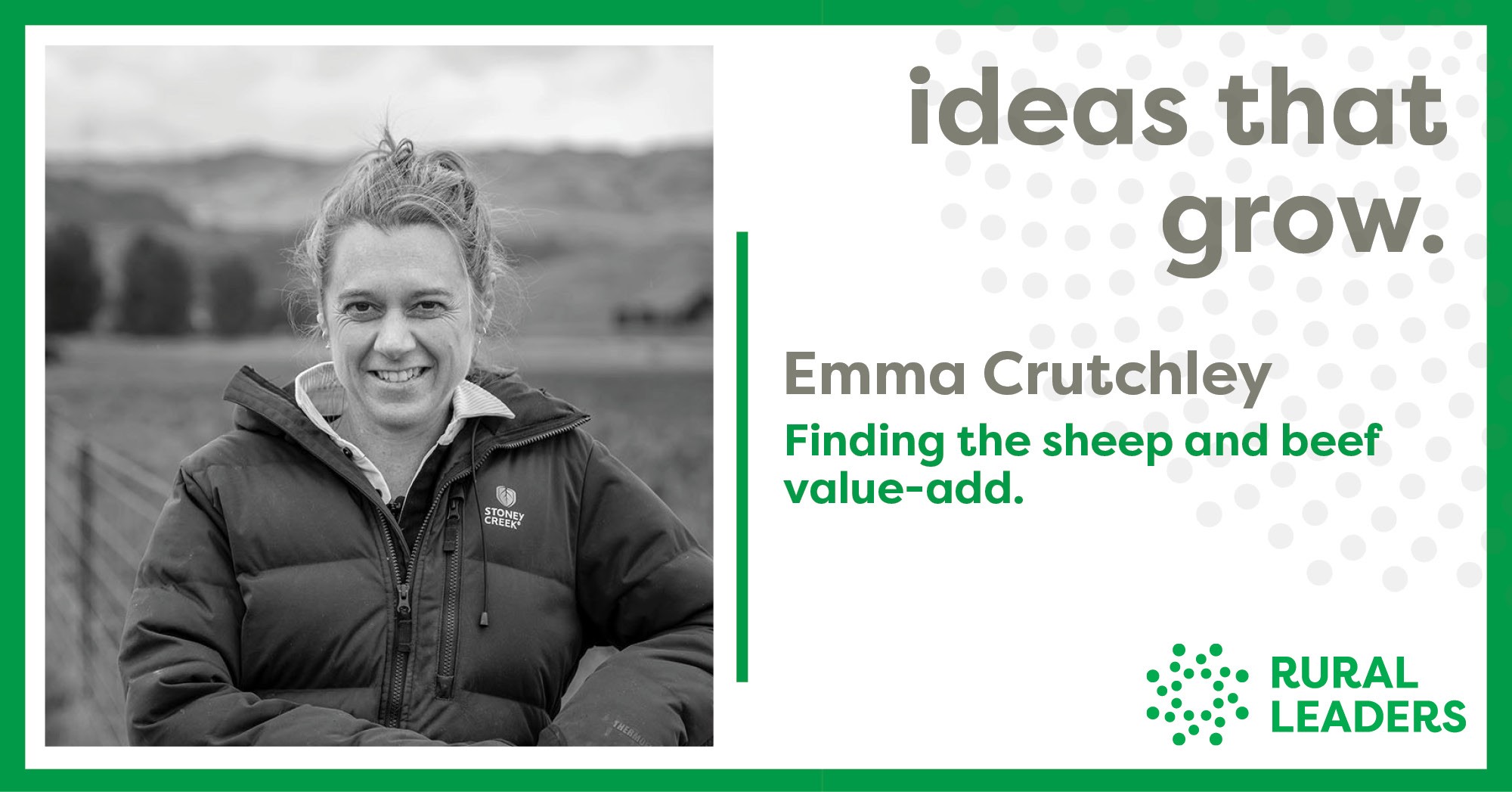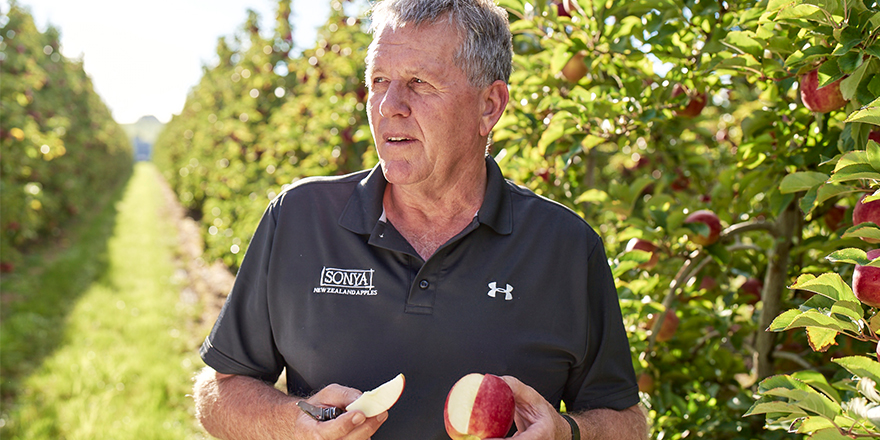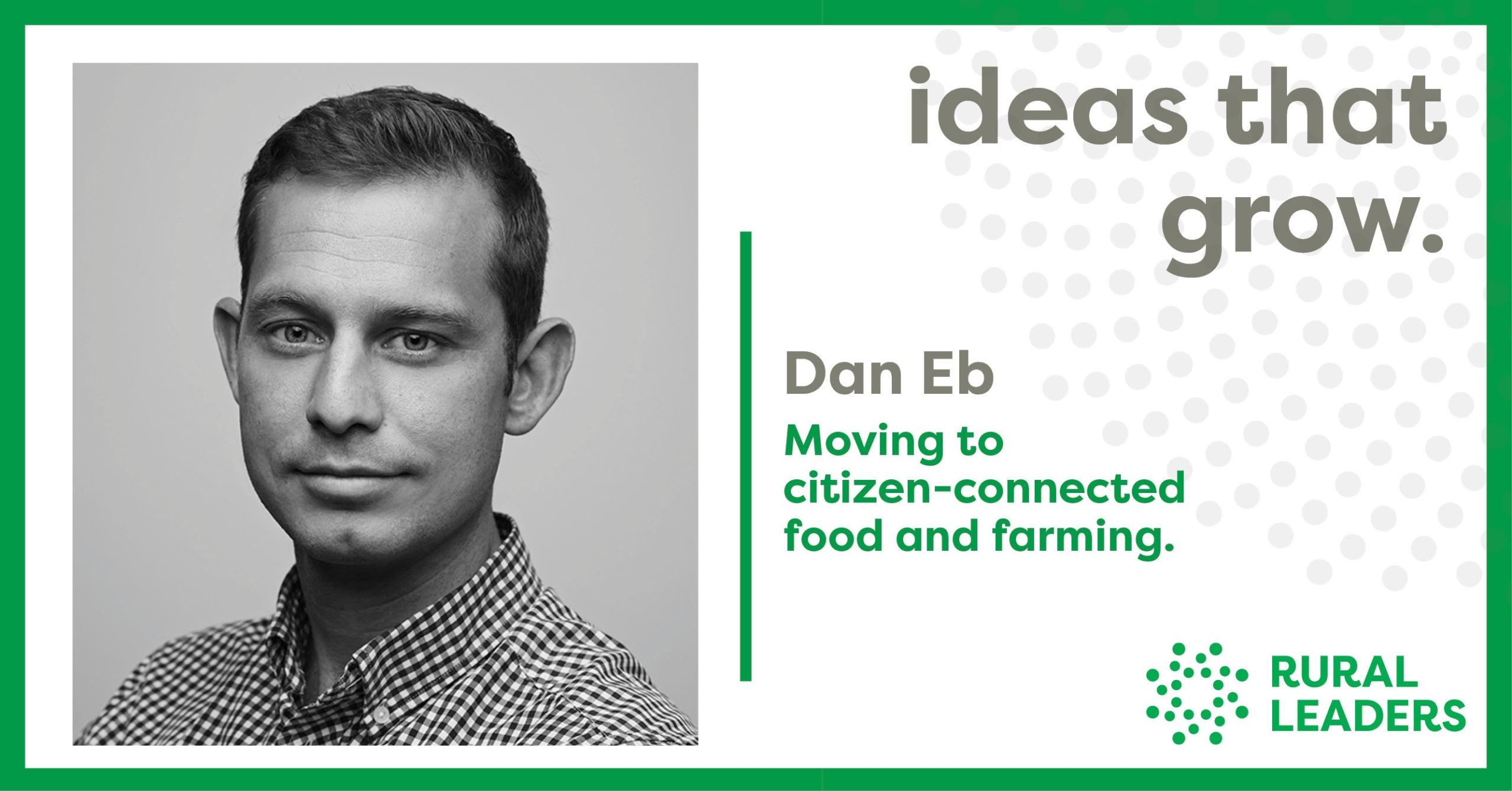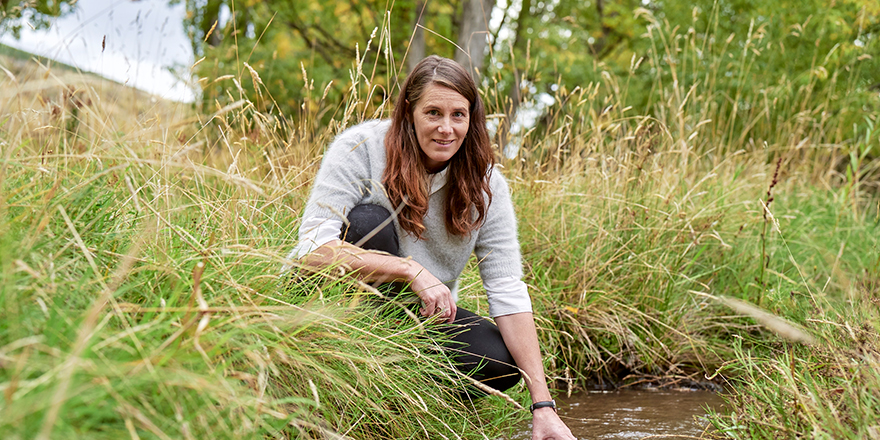In this episode of Ideas That Grow, Bryan Gibson, Farmers Weekly Managing Editor, talks to Thomas Holmes, arable farmer and a 2024 Kellogg Scholar.
Thomas discusses his family farm’s evolution, overseas experience, his Kellogg research report and his Kellogg experience.
Thomas unpacks his report’s ‘what next’ view of arable farming in Canterbury.
He discusses profitability challenges, diversification, and integration with other sectors. Thomas advocates collaboration, mindset change, and leadership from younger farmers to adapt to climate, market, and technological shifts.
Listen to this episode of Ideas that Grow, or click on one of the platform icons below to listen on your favourite player:
Episode Transcript
You’ve joined the Ideas That Grow podcast, brought to you by Rural Leaders. In this series, we’ll be drawing on insights from innovative rural leaders to help plant ideas that grow so our regions can flourish. Ideas That Grow is presented in Association with Farmers Weekly.
Bryan Gibson, Managing Editor of Farmers Weekly:
You’re with Ideas That Grow, the Rural Leaders podcast. I’m Bryan Gibson, the Managing Editor of Farmers Weekly, your host, as always. With me on the show this week, we’ve got a very recent Kellogg scholar, Thomas Holmes, arable farmer from Canterbury. G’day, Thomas. How’s it going?
Thomas Holmes, Arable Farmer, 2024 Kellogg Scholar:
Good, thank you. How are you doing?
BG: Pretty good. You did the Kellogg programme just last year?
TH: Yes, I was in cohort one in 2024, #52 was our cohort. It’s still fairly fresh in the mind.
BG: Have you recovered?
TH: I think the brain has. It’s a lot. It’s a full-on programme. You can’t really mentally prepare for it. It’s one thing going in there with all these perceived ideas, but it’s another just sitting there and listening. It’s very eye-opening. It takes a lot of time.
Family Farm Background and Evolution
BG: You’re obviously an arable farmer. Tell me a little bit about your journey there. Did you grow up on a farm?
TH: Yes. I’m a fifth-generation mixed-growing farmer in Methven. My family has been there for coming up 150 years, one of the founding families of the local township. The farm has decreased over the generations. It started off at around 6000 acres. We’re now down to about 550. It’s the journey of succession and having a farm for a long time. It gets smaller and has changed a lot.
I guess when I was on the farm full-time, we were doing mixed arable, so just doing many crops, about 300 hectares of crops, 650 bull beef. So, finishing to 600kg plus and 2000 lambs. But recently, in the last year, we’ve downscaled. Just the family farm’s left, so it’s about 220 hectares. It’s a never-ending change, really. What’s next? There’s a lot going on in the industry, and it’s working out what, individually, you can do.
Career Path and International Experience
BG: Did you always know or want to carry on the family farm?
TH: I did the typical Lincoln Uni, Ag-Sci. I went farming straight out of uni. I did various jobs overseas and here, everything from large-scale arable farming in the UK, in Canada, and a big beef finishing farm in Scotland. I’ve dabbled in robotic milking, did a little bit of organic cropping, and then worked on a large-scale farm in Dore, which gets all the processed vegetables, and then the family farm.
I’ve always wanted to be a farmer, and I think it’s a fantastic career. Obviously, at the moment, the arable industry is at a lull. I think it’s still a fantastic industry. Growing crops, growing animals, I think it’s probably the best job in the world, but it just doesn’t pay that well at the moment, so you have to do everything that you can to make it work.
Kellogg Research Focus: The Future of Arable Farming
BG: Touching on your Kellogg report, you look to see some ways for the success of arable farming in Canterbury in the future. Obviously, as you mentioned, times are pretty tough for arable farmers right now. But what brought you to that topic?
TH: I wanted to really dive into the sector. It wasn’t necessarily the dynamics. It was more about ‘what next for the sector’ because the profitability side of things has not improved for a long time. It’s been hidden with growers increasing yield to basically beat inflation, and inflation has caught up. We’re in a situation where we can’t really out-compete inflation. There needs to be more options available to growers, whether it’s different crops or different opportunities that aren’t necessarily arable.
I guess it got me thinking, ‘where do growers see themselves in the next 25-50 years?’ I was looking at my career, lifetime and beyond. It’s really easy to look a year ahead or two years ahead. But I thought, well, why don’t we just push it to 25-50, because people don’t think like that, necessarily. And this industry is very much on the point where they are at a crossroads. They need to make some real dramatic changes to actually improve the profitability for the growers to enable them to still do what they love to do, and that’s grow crops. They’re mixed, so they have animals, but predominantly, their passions are machinery and growing crops for the end users.
I think that’s what really drove me to look at ‘what next for the industry’, where are we going and where are the opportunities as a sector as growers. To work together was my thing, being involved in a few discussion groups. With FAR Growers Leading Change groups, it’s really important to have those connections and talk to growers of similar ages and stages, and some of them are of similar sizes and bigger, but they’re all in that same boat of ‘what does the arable sector look like’, because you can’t just keep on doing what we’re doing.
Farmer Perspectives: Looking 25-50 Years Ahead
BG: You mentioned that we’re not very good at thinking further out, and you were looking 25 to 50 years. What was the range of views you got when you talked to arable farmers?
TH: For a lot of them, they were taken back by that view, because at that current time, last year, we had one of the wettest harvests in history, and people were pretty, dare I say, depressed and a little bit in a slump. It wasn’t the best timing to do a Kellogg, but I knew it was going to be a challenge to talk to them. Because from my opinion, when you’re in the lowest point, you usually make some very strategic decisions because you need to. You can’t carry on doing what you’re doing, so you’ve got to get out of the hole and change. A lot of them were like, ‘we’re looking at diversification. We’re looking at off-farm income in some way, shape, or form’.
And then there was guys that were looking at doing berry fruits or apples. They looked at the analysis. At the moment, it doesn’t work for them, but they’re looking beyond arable, a lot of them. And some of the guys that I interviewed are already at that stage, they’re doing processed vegetables, they’re doing onions, potatoes, carrots, and their specialty seeds as well. But they’re looking beyond arable because the margins just don’t stack up. But they’re important to be part of any rotation. You need your cereals, you need your grass, you need clover in your crop rotation to keep the system going, but it wasn’t necessarily their money maker. It’s a harsh reality of things and I think growers understand that. There’s a lot that do deer grazing or beef animals, a lot do lamb finishing when it stacks up financially.
So they’re always doing something different to enable them to do what they love. And I think that’s the key point. And maybe that takes away the value of ‘I’m an arable farmer’, but the reality is, you’re still an arable farmer, you’re just going to be a very diverse arable farmer – more integrated with multi-different revenues coming off farm. And Arable might not bring a lot to the table. But at the core, I think that’s where people get a bit frustrated, because it’s what they love, and it’s a hard thing to watch. But you’ve got to make the right choices.
Key Recommendations: Integration and Collaboration
BG: Obviously, there was diversity of opinion amongst the people you talked to. You wrapped it all up in your report and came up with a set of recommendations?
Integration with Other Agricultural Sectors
TH: My recommendations for the industry was looking at when you become more integrated as a sector, and we’re already well-integrated into dairy with providing your specialty seeds, so your grass, your clovers, your straw. A lot do grazing. So you’re already there. There’s opportunities to be more integrated into your chicken and pig operations. I think there’s a real opportunity for the likes of your trading of straw for nutrients. The one thing that crop farmers need is nutrients to grow crops, and it might not be the usual thing, but it’s a common practise overseas to spread cattle muck and pig muck and chicken muck. And it’s not really a common practise here in the arable sense. I think it’s that trading of nutrients. It’s looking at how we can integrate into their supply chains and be part of that because, individually, Arables is not going to do it, and we need to be smart about that.
Breaking Down Competitive Barriers
TH: Another one was probably looking at collaboration. I think the big thing with the industry being so small, we’re very competitive, we’re very individualistic. We compete for contracts. It gets pretty cutthroat at points, especially when there’s not a lot of contracts around. Some clover markets, especially, are very tightly held, very contestable, and at the moment, still in a slump overseas with oversupply from Europe and America. We’re looking at another year or so of actual tough times.
I think that’s where, in the industry, groups need to actually form to collaborate, whether that’s through sharing machinery, going together to buy input costs, to go bulk, to get a little bit cheaper deals, share chemistry. That mindset, I think, really needs to change because we’re so focused on doing our own stuff, growing our own crops. When the reality is, I’m in a group of ten people, different farms within ten kilometres of Methven, and we’re all pretty similar sizes, similar operations. There’s a little bit of difference, obviously, but there’s no reason why we can’t actually work together.
You could buy a bigger machine, cultivator, and go cultivate all these guys’ crops. We’ll do the ground prep and all that stuff. You could just do that. Builders don’t just do our own thing. It’s just very set. It comes down to control, but also it’s your farm, you do what you want to do. But that’s the mindset that I think needs to change of where we can actually work in together, help each other out, actually spread the costs over a large area. And contractors do that. That’s why they’re so successful in terms of their scale, because they’ve got so much land they’re actually covering, doing various jobs with people that don’t have time.
Overcoming Traditional Barriers
TH: Farmers just don’t do that. They don’t seem to do it. I think it becomes too hard because if you own a piece of machinery with somebody and someone breaks it, then it gets into a bit of a fight on who’s paying for what. Maybe there needs to be systems in place that you can just split the costs. That’s why a number of growers are involved in it. It’s just this simple mindset change that I just don’t think is there, but it needs to be.
The Challenge of Farm Independence Culture
BG: It comes up a lot, and it’s often a hurdle that’s hard to clear in the food and fibre sector. It goes back to that traditional feeling of whatever’s inside the boundary of these fences is mine, and I am the sovereign of what happens here. People have trouble taking advice from people that maybe they don’t trust or having the government tell them how to do things. That’s a pretty hard barrier to break through.
TH: Yes, I think so. But if you go back 100 years or so, you had 50 men and women on your farm doing your work for you. Why is that any different? It’s just in a modern context. But I feel it’s just the community has changed. Over time, obviously, you’ve got different people coming in and out. Farm communities are very tight, but they’re not tight in the respect that they’re actually working together. There’s obviously aspects of it across the country, and there’s communities that are doing really well, and they do work together, but I don’t see it enough, especially in the arable sector.
I question a lot, and it’s more what can you do about it to make some of these things actually improve the bottom line? Because ultimately, it is about the bottom line for arable. I think that was the main challenge: profitability. A lot of these opportunities are about helping to solve profitability, not necessarily entirely solve the profitability issue. It’s not going to be one thing. It’s going to have to be a magnitude of things to actually make any real change.
Personal Leadership Development Through Kellogg
BG: Now, as well as the scholar report, obviously, the Kellogg programme is focused on leadership development. How has that changed you? How do you approach life and work now you’ve got these tools in the toolkit?
TH: For me, I just take any opportunity I can to do projects. For work, to use the knowledge that I’ve got, but also to just put my hand up for things. Locally, I’m involved with my local catchment group. It’s in the farm, it goes through the farm. We’ve got a bit of a potential flooding issue with the creek. It’s just actively getting involved in the community a bit more. Also just keeping involved in those Grower Leading Change groups is really important to keep a bit more stabilisation on what’s going on on the ground. For me, long term, it’s looking at opportunities in leadership. I think there needs to be more people, dare I say, my age on those boards because we are the future.
The reality is people my age and younger than me are the ones that are going to be farming in the next 35 to 40 years, 50 years. It’s actually getting their opinions across, and I think that’s probably something that I’m very passionate about, actually getting our seat at the table and getting our opinions heard because we haven’t got 30 or 40 years life experience or business experience. You’ve got to start somewhere and I think that’s really about putting your hand up and not being afraid to actually just try things. Well, this podcast. I think it’s good to be able to get your opinion across. It’s a different way of messaging, really.
The Need for Disruption and Adaptation
BG: Like you say, your studies discovered that there needed to be some change or some new thinking in the arable sector. It takes people to usher that in or help get that message across and get the wheels turning for that to happen.
Adapting to Climate and Market Changes
TH: I think so. You’ve got to disrupt the system. It’s not necessarily about criticising what the system is. It’s about actually looking at, well, ‘are we fit for purpose? Do we actually need to change?’ And the reality is we do. And I think that’s been pretty apparent in the last decade with the likes of trade, the likes of volatility we’ve had with the weather, the way harvests have been. We need to change how we do things because we’re not getting the same climatic conditions that we had in the early 1980s and 1990s. The Nor’westers aren’t as prominent. We’re not actually getting the great harvest of those days. It’s certainly not as hot where I am in summer as it used to be.
We need to change how we farm with all that technology and what’s coming for us. I think there’s plenty of other opportunities for arable to be part of that story, whether it’s plant proteins or these new food trends that are coming forward. We need to be part of that story instead of just the guys that grow grain and seed, because we are more from that. I think that’s where we need to actually put a hand up and try. I think that’s probably really taking us off the farm a bit more than we’re comfortable with, because the reality is we need to go beyond what we’re doing. It is changing your mindset and it’s not an easy thing to do.
The Value of Being Challenged
TH: For me, Kellogg has definitely changed my mindset because you become so siloed and rigid in your own thoughts because you just get so set in what you do and how you think, and you think you’re right, and you get challenged. I think it’s fantastic to get challenged because there’s so many people with different opinions from various backgrounds, it just really gives you an open mind. Because no one’s right. It’s just actually just listening to someone else’s opinion. Regardless whether you disagree with it or not, I think it’s actually just it gives you that understanding of where they’re coming from and why they think like that.
I don’t think it’s a bad thing to be challenged. I think that in the Ag sector in New Zealand, they need to be challenged because I don’t think they’re necessarily adapting to what is happening out there. I think it is pretty hard to change at the speed that things are going, especially with the tech and the way supply chains are working and the market’s always changing. It is hard, but we need to be a bit more nimble instead of reactive, I think.
Recommendation for the Kellogg Programme
BG: Having more colleagues with that mindset, AKA, going through the Kellogg programme, would be good, so, something you’d recommend to others?
TH: Yes, 100%. I think the Kellogg programme is a fantastic programme. It not only challenges you on your thoughts and your views, but it just gives you an eye into what the food and fibre sector is beyond your sector. You’re in it with like-minded people. It’s a really enjoyable process. I think the big part of it is actually just the networking, the talking to industry leaders in the Chatham House rules sense, where you can get some real open discussions, where you don’t get that in the real world. I think that’s one of the beauties of Kellogg. It opens a lot of doors. I got a lot of interviews just based on that I was doing Kellogg, obviously, being an average farmer helped.
But I think people just love the programme. They think it’s a really great programme. It’s a good thing to do if you want to push yourself to try something different and find a project. If you got a project that you really want to find something about, just do it. I think it’s a great thing to do. Don’t be afraid to change your mind on it either because I think you get challenged, you get on it, and it’s a good learning process.
BG: Thanks for listening to Ideas That Grow, a Rural Leaders podcast presented in Association with Farmers Weekly.
